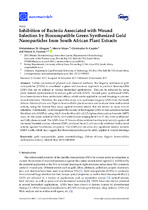Inhibition of bacteria associated with wound infection by biocompatible green synthesized gold nanoparticles from South African plant extracts
Date
2017Author
Elbagory, Abdulrahman M.
Meyer, Mervin
Cupido, Christopher N.
Hussein, Ahmed A.
Metadata
Show full item recordAbstract
Unlike conventional physical and chemical methods, the biogenic synthesis of gold
nanoparticles (GNPs) is considered a green and non-toxic approach to produce biocompatible
GNPs that can be utilized in various biomedical applications. This can be achieved by using
plant-derived phytochemicals to reduce gold salt into GNPs. Several green synthesized GNPs
have been shown to have antibacterial effects, which can be applied in wound dressings to prevent
wound infections. Therefore, the aim of this study is to synthesize biogenic GNPs from the South
African Galenia africana and Hypoxis hemerocallidea plants extracts and evaluate their antibacterial
activity, using the Alamar blue assay, against bacterial strains that are known to cause wound
infections. Additionally, we investigated the toxicity of the biogenic GNPs to non-cancerous human
fibroblast cells (KMST-6) using 3-[4,5-dimethylthiazol-2-yl]-2,5-diphenyl tetrazolium bromide (MTT)
assay. In this paper, spherical GNPs, with particle sizes ranging from 9 to 27 nm, were synthesized
and fully characterized. The GNPs from H. hemerocallidea exhibited antibacterial activity against all
the tested bacterial strains, whereas GNPs produced from G. africana only exhibited antibacterial
activity against Pseudomonas aeruginosa. The GNPs did not show any significant toxicity towards
KMST-6 cells, which may suggest that these nanoparticles can be safely applied in wound dressings.

